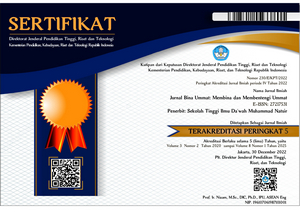METHOD (MANHAJ) OF PROSELYTIZING OF THE PROPHET IN THE PHASE OF MAKKAH AND MEDINA
DOI:
https://doi.org/10.38214/jurnalbinaummatstidnatsir.v5i2.144Keywords:
manhaj dakwah, dakwah Nabi, fase Makkah, phase MedinaAbstract
Thirteen years of proselytizing in Makkah and ten years in Medina were periods of the struggle of the Prophet Muhammad to lay the foundations of Islam on the face of the earth. The Prophet had gone through all forms of conditions and challenges of proselytizing, even having to deal with close relatives who opposed Islamic proselytizing. This condition further strengthened and strengthened the principle of the Prophet's proselytizing struggle in the early days of seeding the beauty of Islam in all corners of Arabia. Despite strong resistance from his people, the Prophet remained steadfast and was able to cultivate proselytizing wisely. The portrait of the Prophet's proselytizing is the perfection of the manhaj of proselytizing, so the pattern of the Prophet in proselytizing must be the main qibla for a da'i in regulating the pattern of his proselytizing in society, of course, by adjusting to the conditions of today's times. Manhaj dakwah Nabi became an important and mandatory reference for every da'i, to know how muslims should behave when facing proselytizing land in society.
Downloads
Published
Issue
Section
License
This work is licensed under a Lisensi Creative Commons Atribusi 4.0 Internasional.
Authors who publish with this journal agree to the following terms:
- Authors retain copyright and grant the journal right of first publication with the work simultaneously licensed under a Creative Commons Attribution License that allows others to share the work with an acknowledgment of the work's authorship and initial publication in this journal.
- Authors are able to enter into separate, additional contractual arrangements for the non-exclusive distribution of the journal's published version of the work (e.g., post it to an institutional repository or publish it in a book), with an acknowledgment of its initial publication in this journal.
- Authors are permitted and encouraged to post their work online (e.g., in institutional repositories or on their website) prior to and during the submission process, as it can lead to productive exchanges, as well as earlier and greater citation of published work (See The Effect of Open Access).




